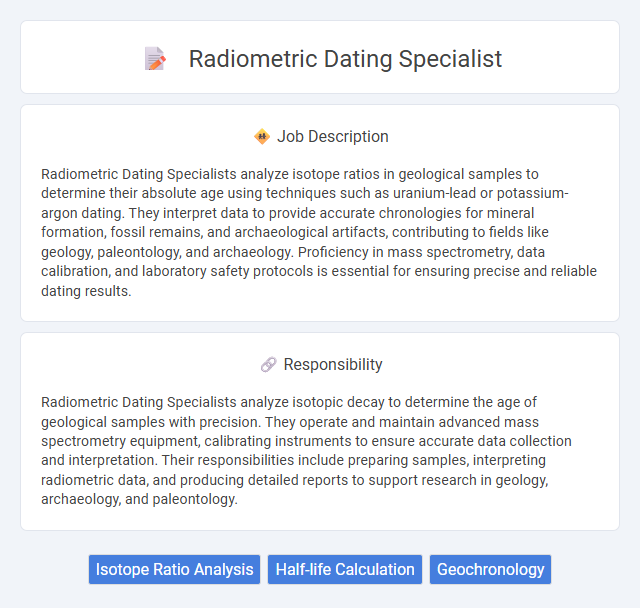
Radiometric Dating Specialists analyze isotope ratios in geological samples to determine their absolute age using techniques such as uranium-lead or potassium-argon dating. They interpret data to provide accurate chronologies for mineral formation, fossil remains, and archaeological artifacts, contributing to fields like geology, paleontology, and archaeology. Proficiency in mass spectrometry, data calibration, and laboratory safety protocols is essential for ensuring precise and reliable dating results.
Individuals with strong analytical skills and a keen interest in geology or chemistry are likely to thrive as Radiometric Dating Specialists. Those who enjoy working meticulously with laboratory equipment and interpreting complex data may find this role well-suited to their abilities. Candidates who prefer a dynamic, field-based environment rather than a controlled lab setting might be less compatible with the typical demands of this profession.
Qualification
A Radiometric Dating Specialist requires a strong background in geology, physics, or chemistry, typically holding at least a bachelor's degree with advanced studies preferred. Expertise in isotope geochemistry, mass spectrometry, and laboratory techniques for analyzing radioactive decay is essential. Proficiency in data interpretation, sample preparation, and knowledge of radiometric dating methods such as uranium-lead, potassium-argon, or carbon-14 dating ensures precise and reliable age determinations.
Responsibility
Radiometric Dating Specialists analyze isotopic decay to determine the age of geological samples with precision. They operate and maintain advanced mass spectrometry equipment, calibrating instruments to ensure accurate data collection and interpretation. Their responsibilities include preparing samples, interpreting radiometric data, and producing detailed reports to support research in geology, archaeology, and paleontology.
Benefit
Radiometric Dating Specialists likely benefit from working in a highly specialized field that offers opportunities to contribute to scientific research and uncover Earth's history. The role may provide access to advanced laboratory technologies and continuous learning about geochronology and isotope analysis. Job stability and collaboration with interdisciplinary teams could also enhance professional growth and expertise.
Challenge
A Radiometric Dating Specialist likely faces the challenge of accurately interpreting complex isotopic data to determine the age of geological samples. Handling potential contamination and ensuring precise calibration of equipment may pose significant difficulties in obtaining reliable results. The specialist probably needs to stay updated with evolving analytical techniques to maintain high accuracy in their assessments.
Career Advancement
Radiometric dating specialists leverage expertise in isotopic analysis and geochronology techniques to accurately determine the age of geological samples, advancing their careers through continuous skill development in mass spectrometry and data interpretation. Opportunities for career growth include roles in academic research, environmental consulting, and the petroleum industry, where precision in dating enhances resource exploration and environmental assessments. Mastery of advanced analytical software and interdisciplinary collaboration with geologists and archaeologists significantly boosts prospects for senior specialist and project management positions.
Key Terms
Isotope Ratio Analysis
Radiometric dating specialists utilize isotope ratio analysis to accurately determine the age of geological samples, fossils, and archaeological artifacts by measuring the decay rates of radioactive isotopes such as uranium-lead, potassium-argon, and carbon-14. Expertise in mass spectrometry techniques, including thermal ionization mass spectrometry (TIMS) and inductively coupled plasma mass spectrometry (ICP-MS), is essential for precise isotope ratio measurements. These specialists interpret isotopic data to reconstruct geological timelines, contributing critical insights to fields like geochronology, earth sciences, and paleoenvironmental studies.
Half-life Calculation
Radiometric dating specialists apply precise half-life calculations to determine the age of geological samples by measuring the decay rate of radioactive isotopes such as Uranium-238 and Carbon-14. Expertise in interpreting isotopic ratios and decay chains is critical for accurate age estimation in fields like geology, archaeology, and paleontology. Mastery of laboratory techniques and software tools for data analysis ensures reliable half-life-based dating results that contribute to scientific research and resource exploration.
Geochronology
A Radiometric Dating Specialist in geochronology utilizes advanced techniques such as uranium-lead, potassium-argon, and carbon-14 dating to determine the age of rocks, minerals, and fossils with high precision. Expertise in isotope geochemistry and mass spectrometry is essential for analyzing radioactive decay and interpreting chronological data within geological contexts. This role supports critical research in earth history, tectonics, and stratigraphy by providing accurate temporal frameworks through calibrated radiometric dating methods.
 kuljobs.com
kuljobs.com